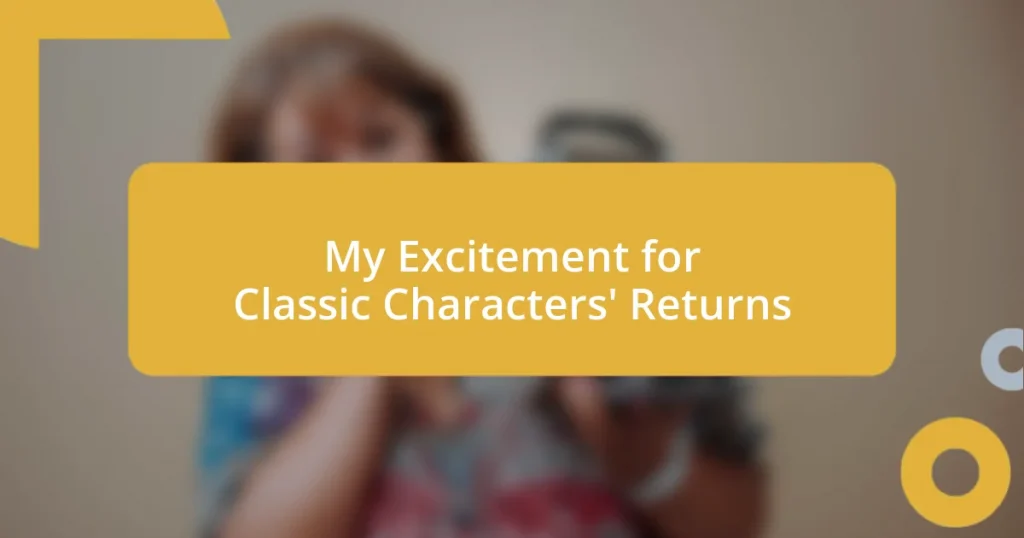Key takeaways:
- The author’s connection with classic characters like Elizabeth Bennet and Sherlock Holmes illustrates how literature shapes understanding of human nature and personal growth.
- Classic characters resonate due to universal themes, deep emotional connections, cultural reflections, symbolic significance, and the nostalgia they evoke.
- Modern engagement with classics through adaptations, discussions, and social media enhances appreciation, keeping timeless stories relevant and sparking new conversations.

My journey with classic characters
My journey with classic characters began in childhood, when I first picked up a copy of “Pride and Prejudice.” I was immediately captivated by Elizabeth Bennet’s wit and resilience. How could a character from the 19th century feel so much like a friend?
As I grew older, my relationship with characters like Sherlock Holmes deepened. I remember solving mysteries in the quiet corners of my family’s library, feeling a rush of excitement when I pieced together clues just like Holmes. Isn’t it remarkable how these timeless figures can inspire our curiosity and problem-solving skills?
Through the years, classic characters have not just entertained me; they’ve shaped my worldview and understanding of human nature. I often think back to how Scrooge’s transformational journey in “A Christmas Carol” prompted me to reflect on kindness and gratitude. Isn’t it fascinating how a simple story can evoke such profound realizations that stick with us for life?

Why classic characters resonate
Classic characters resonate with us because they embody universal traits and emotions. For instance, when I first read “The Great Gatsby,” I was struck by Gatsby’s relentless hope. It reminded me of my own dreams and desires, making his journey all the more relatable. Characters like these transcend their narratives, speaking to our shared experiences in life’s ups and downs.
Here are a few reasons why classic characters continue to hold a special place in our hearts:
- Timeless Themes: They tackle themes like love, betrayal, and redemption, echoing our own personal struggles.
- Deep Emotional Connections: Their journeys often mirror our life experiences, evoking empathy and understanding.
- Cultural Reflection: They act as windows into different eras, reminding us of the society we live in today.
- Symbolic Significance: Many classic characters symbolize larger ideas, like justice or bravery, allowing us to project our values onto them.
- Nostalgia: Revisiting these characters often brings back cherished memories from our own past, which is always comforting.

Engaging with classic characters today
Engaging with classic characters in today’s world is easier than ever, thanks to adaptations across various media. I recall rewatching the film “Emma,” which brought the delightful mischief of Jane Austen’s character to life in such a vibrant way. The modern twist in the screenplay had me laughing out loud while still appreciating the depth of Emma’s journey. Doesn’t it feel like seeing an old friend with a fresh perspective?
Moreover, I often find joy in revisiting classic literature through discussion groups and online forums. Just last month, I engaged in a passionate debate about the morality of Captain Ahab in “Moby Dick.” The perspectives shared by others highlighted how timeless the themes of obsession and revenge are, and it struck me how intensely relevant those discussions can be today. How wonderful is it that classic characters spark conversations decades after their creation?
Social media also plays an intriguing role in this engagement. Platforms like Instagram are filled with quotes from characters like Jay Gatsby paired with stunning visuals, inspiring discussions among users. I love how these snippets can ignite curiosity and encourage people to dive into the books. It makes me wonder, could a mere quote bring a whole new wave of readers to classic literature?
| Classic Characters | Modern Engagement |
|---|---|
| Elizabeth Bennet | Adaptations like films and series keeping her relatable |
| Sherlock Holmes | User-generated content, like fan theories and podcasts |
| Jay Gatsby | Memes and quotes inspiring renewed interest |
| Emma Woodhouse | Online discussion groups deeply analyzing her motivations |

How to appreciate classic characters
Appreciating classic characters often begins with immersing yourself in their stories. I remember the first time I picked up “Pride and Prejudice.” The sharp wit of Elizabeth Bennet drew me in immediately; her boldness and fierce independence resonated with my own aspirations. Hasn’t everyone felt the need to stand up for themselves like Elizabeth?
Analyzing the societal and cultural context in which these characters were created can deepen our appreciation. For instance, understanding the constraints faced by characters like Jay Gatsby helps me see his extravagant parties not just as gatherings, but as desperate attempts to transcend his past. It makes me think: how many of us create facades to hide our insecurities?
Engaging with adaptations can also enhance our love for these characters. I distinctly remember watching a modern retelling of “Romeo and Juliet,” where their love story was set against a contemporary backdrop. It made me reflect on how universal their passionate drive really is, despite differing times and settings. Isn’t it fascinating to see how love remains a timeless theme?

Sharing my classic character experiences
I love revisiting classic characters through the lens of my own experiences. One of my favorite moments was when I encountered Hester Prynne from “The Scarlet Letter” during a college literature class. Her courage in facing societal judgment resonated deeply with me, especially as I navigated my own challenges at the time. Hasn’t everyone felt the weight of judgment at some point? Hester’s defiance inspired me to embrace my authenticity.
Discussing these characters with friends adds another layer to my appreciation. I recall a lively night with friends when we dissected the complexities of Heathcliff from “Wuthering Heights.” As we shared our interpretations, I realized how passionately literature can evoke emotions and debates. Don’t you think every character reflects a part of our own struggles and desires?
Then there was that unforgettable day when I dressed as Miss Havisham for a themed literary gathering. Experiencing her tragic story from “Great Expectations” in a way that put me in her shoes was eye-opening. It made me ponder the impact of unfulfilled dreams and how they shape our lives. How incredible it is that just one character can teach us so much about loss and resilience?















